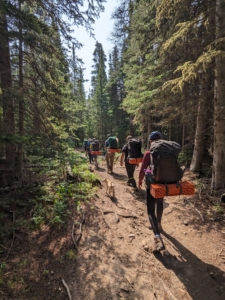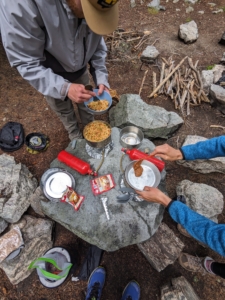Backpacking For Mental Health
 Getting out into nature can mean walking, hiking, biking, kayaking, or other similar activities. Stepping outside can help people keep a healthy weight or even lose weight by increasing activity levels.
Getting out into nature can mean walking, hiking, biking, kayaking, or other similar activities. Stepping outside can help people keep a healthy weight or even lose weight by increasing activity levels.
Being in nature can also boost your mood and improve your mental health. Spending quality time in the great outdoors reduces stress, calms anxiety, and can lead to a lower risk of depression, according to a 2015 study by researchers at Stanford University. Many other studies have confirmed that spending time in a natural environment can reduce stress, improve mood, and enhance overall mental well-being.
With a campus only a short distance away from the spectacular landscape of the Rocky Mountains, the treatment team at Colorado Recovery understands these benefits well and utilizes the great outdoors as part of the treatment programs for schizophrenia, bipolar disorder, and other mental illnesses. Exposure to the healing power of nature is part of the treatment philosophy.
Colorado Recovery held its second annual backpacking trip in July. Led by executive director Terry Stiven and community organizer Peter Kamback, the three-day excursion up and around the Buchanan Pass area in Colorado created an attitude of team spirit as everybody felt they were all together in this challenge.
*I observed that some of our clients who struggle with social interaction seemed to feel comfortable talking and sharing their challenges and experiences,” Stiven recalls. “This is not an easy hike and our clients came home with a sense of confidence that they achieved some really hard hikes, braved cold weather, and got by on basic necessities.”
Like last year’s outing, everybody felt this year’s trip was a big success. “We had five clients join us this year including two new clients and three returning clients,” says Kamback. “Preparation was similar to last year’s trip. We encouraged everyone going on the trip to join us for our hiking group each week to condition themselves physically.”
 They also learned what to expect on the trip in terms of weather conditions, temperatures (day and night), food, gear, safety, wildlife, and proper leave-no-trace waste disposal practices.
They also learned what to expect on the trip in terms of weather conditions, temperatures (day and night), food, gear, safety, wildlife, and proper leave-no-trace waste disposal practices.
“We also asked them to consider what to do with their time away from technology and the modern conveniences of their daily lives,” says Kamback. “As last year, this was the biggest adjustment for most clients on the trip. I think it was incredibly valuable to have them removed from their phones, social media, and the countless other digital distractions they have grown accustomed to.”
All hikers agreed that even though giving up the smartphone was difficult at first, they all developed an appreciation for the peace, quiet, and beauty the natural world provides.
“Another great benefit of the trip is that it allows our clients to learn something about themselves,” explains Kamback. “They had the opportunity to discover that when faced with a challenge they can handle and overcome it.”
Hiking on the trip was no easy task. “As much as we tried to keep weight in our packs to a minimum, the strain of the packs became burdensome after a few miles on the trail,” Kamback remembers. “Everyone faced fatigue and frustration—inevitable aspects of any backpacking excursion. The physical and mental challenges were real and the clients had to discover—individually and as a group—how to face these challenges.”
Nighttime also offered difficult situations the clients were not used to in their daily lives. “Some of them experienced less than comfortable sleeping conditions including cold temperatures and primitive bedding,” recalls Kamback. “Again, these are all normal experiences of a backpacking trip. These expectations were clearly expressed in preparation for the trip. However, the reality is usually not fully understood until experienced. But at the end of the day—or night—our clients became aware of their ability to endure and grow as a result of hardship.”
The excursion wasn’t all hardships, either. “We had plenty of time to enjoy the tranquility of nature as well as each other’s company,” Kamback remembers. “We experienced ideal weather conditions on a day hike to a beautiful lake only a couple of miles from camp. We welcomed each morning together by making warm beverages on a stove. We also enjoyed cooking our meals as a group and spending some time around a campfire in the evenings. Many clients found it pleasant to simply sit by the creek or explore the surrounding woods during their free time.”
“Having a sense of accomplishment on the trail significantly boosts our clients’ self-esteem,” says Kamback. The self-confidence necessary for clients to succeed in the wider community can be strengthened on a wilderness trail. At Colorado Recovery it is our mission to help adults with serious mental health issues stabilize their illness, minimize symptoms, improve functioning, and enhance each person’s social inclusion, quality of life, and sense of meaning in life.
Colorado Recovery transitioned to a non-profit organization in June. This pivotal change underscores our commitment to providing exceptional care and support to our clients while ensuring greater accessibility through scholarships and donations.
If you have questions about our recovery model or our services to treat schizophrenia, bipolar disorder, and similar mental illnesses, call us at 720-218-4068 to discuss treatment options for you or the person you would like to help.
.


